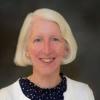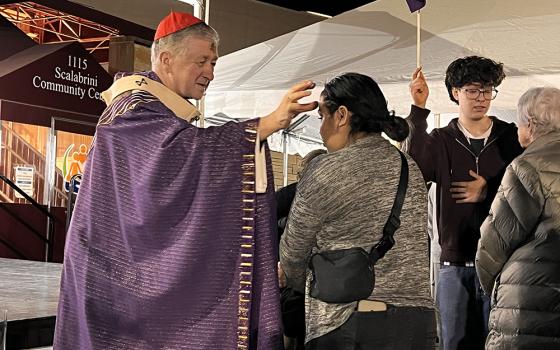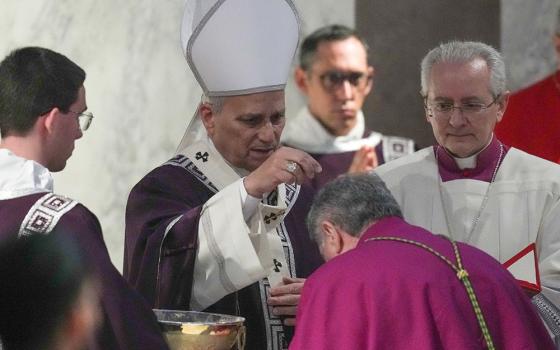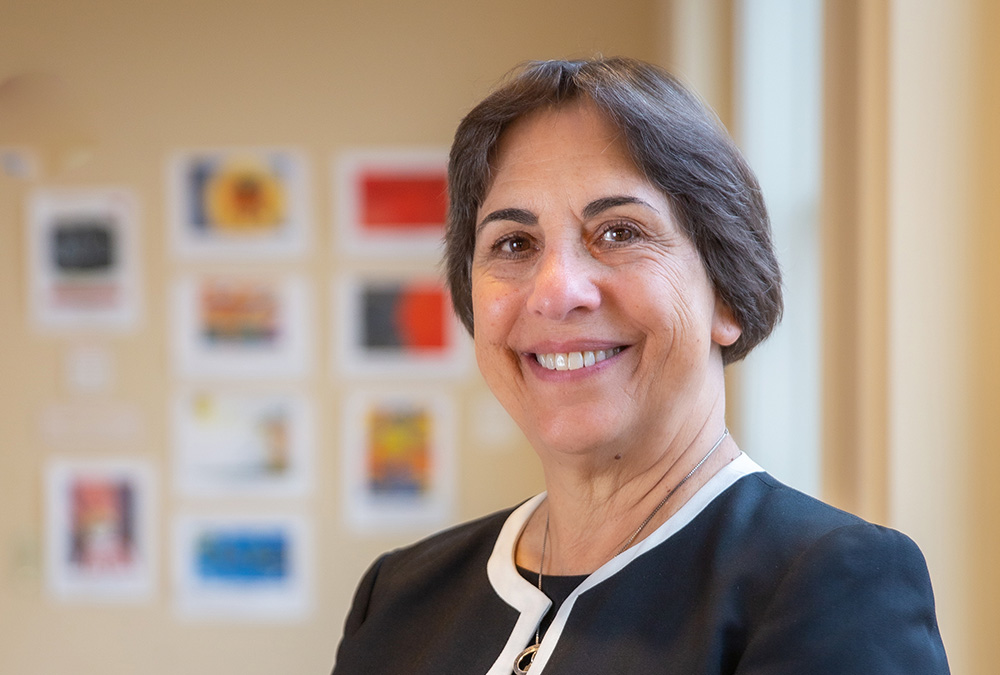
Holy Family of Nazareth Sr. Linda Yankoski in 2021 (Courtesy of Holy Family Institute)
After more than 50 years as a Sister of the Holy Family of Nazareth and almost 40 years as CEO of Holy Family Institute, a Holy Family-sponsored ministry, Sr. Linda Yankoski will turn over the leadership role to Michael Sexauer in September of this year.
Holy Family Institute began in 1900 as an orphanage. Today, as one of the largest social service organizations in Pittsburgh, it has a staff of 400 and serves more than 40,000 people each year, with programs for behaviorally challenged children, families in need, drug and alcohol addiction counseling, energy assistance for local residents and workforce education for young adults.
Last year, Yankoski received the Pittsburgh Business Times' Women of Influence Career Achievement Award for exceptional leadership and performance over the course of her career.
Sexauer, who joined Holy Family Institute in 2015, will be the first layperson to lead the organization. Yankoski will stay on at Holy Family Institute in an advisory capacity for charism and mission.
Global Sisters Report: You've spent your entire career at Holy Family Institute?
Yankoski: I came here as a novice. The provincial at the time, Sr. Mary Edward, thought all the young women who just made their vows should go work for a year. I was studying psychology, so they put me as a case aide in the social services department here, to train me on the job.
Advertisement
I came because I took a vow of obedience, but I fell in love with it, and I've never left. I went to [University of Pittsburgh] and got a degree in social work. At the time, Holy Family Institute provided children in need with a therapeutic living experience supported by a multidisciplinary team, but then we started some residential programs. Working with these children who experienced abuse and neglect, I just learned what I could to help them.
You became the director of Holy Family Institute when you were just 35. What was that like?
I became the executive director here in 1988. I was in my mid 30s. In my early years, I was a nonprofit leader in a sea of men. The mantle of being a sister was helpful, but as women in the church, sometimes you feel like you're being patted on the head.
I also had a lot to learn in terms of leadership. I stumbled. I learned from mistakes. I had to really learn to listen. Through the years, I've learned to slow down and listen and let other people.
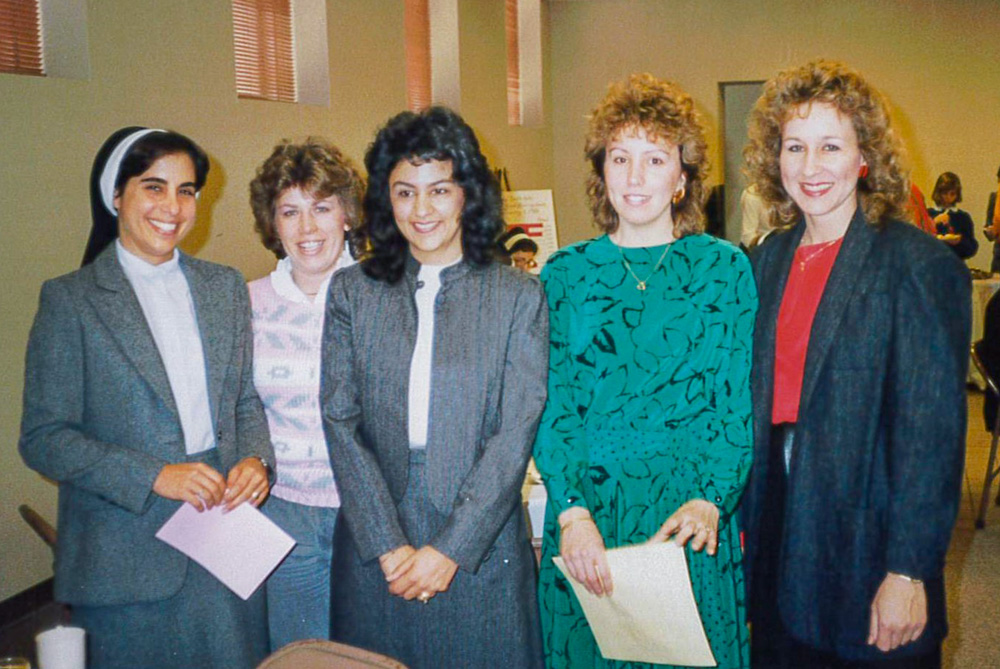
Holy Family of Nazareth Sr. Linda Yankoski, left, with other Holy Family Institute staff sometime in the 1980s (Courtesy of Holy Family Institute)
What have been some of the greatest challenges of your career at Holy Family Institute?
We had some major challenges in the 1980s when the stock market crashed, and [President Ronald] Reagan changed all the government programs, and welfare money was wiped out of the system. We found a way to recreate ourselves and move on.
That's kind of been the story of Holy Family Institute. We had one service when I started here, just residential care, and, in the years that I had a chance to help the organization, we added maybe 14-15 programs, doing things that the community needed. Reading the signs of the times and changing with the changing needs of the community.
What about any personal challenges?
When I was in my 30s, realizing that I wasn't going to have children was a real challenge for me for a little while. Because I was taking care of other people's children here, that got me through.
As the kids grew up and left, they came back, they got married. I went to their weddings, they had children. I was there for the birth of one of my girls' babies because her boyfriend didn't show up, so I experienced my first birth. I held the baby the minute it was born.
I've been blessed to have these moments of life experiences that I would have liked to have had but gave up.
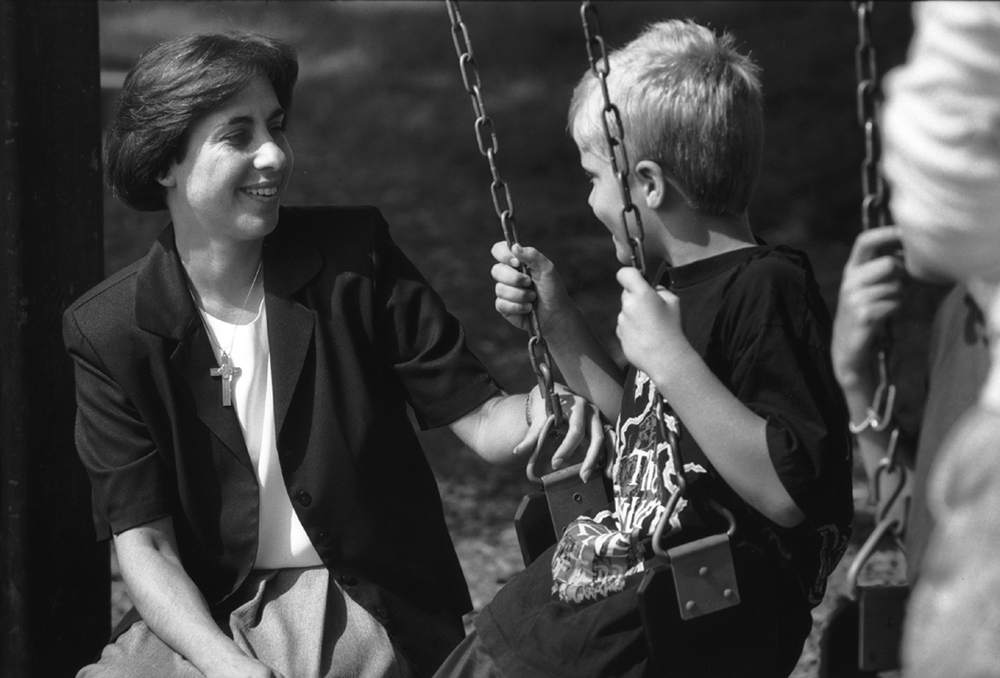
Holy Family of Nazareth Sr. Linda Yankoski talks to a child on a swingset at the Holy Family Institute in Pittsburgh in an undated photo. (Courtesy of Holy Family Institute)
Taking care of children in crisis is difficult and stressful work. Where do you find sources of strength?
Prayer, reflection, Scripture. During my novitiate, we studied with [Benedictine] Fr. Demetrius Dumm, an amazing Scripture scholar from St. Vincent [Archabbey, Seminary and College]. He opened the Scriptures to me and taught me the meaning of religious life. He had a lot to do with my vocation. I still have my notes from his class!
When we made our final vows, we had to choose a mystery. I chose "Jesus, Son of David." David reminds me that we can sin and be redeemed.
I love to read the psalms. David was the author of the psalms. And David sinned and picked himself up and got on with life. David was told he could never slay Goliath, but he said, "He's so big. How can I miss him?" We all have a Goliath in our life — something that is big and insurmountable. The question is, how do we overcome it?
What have you learned from your time at Holy Family Institute?
Watching kids go through different challenges, I've seen that when they are given the opportunity, they could blossom. I've learned to never give up. I've become a hopeful person.
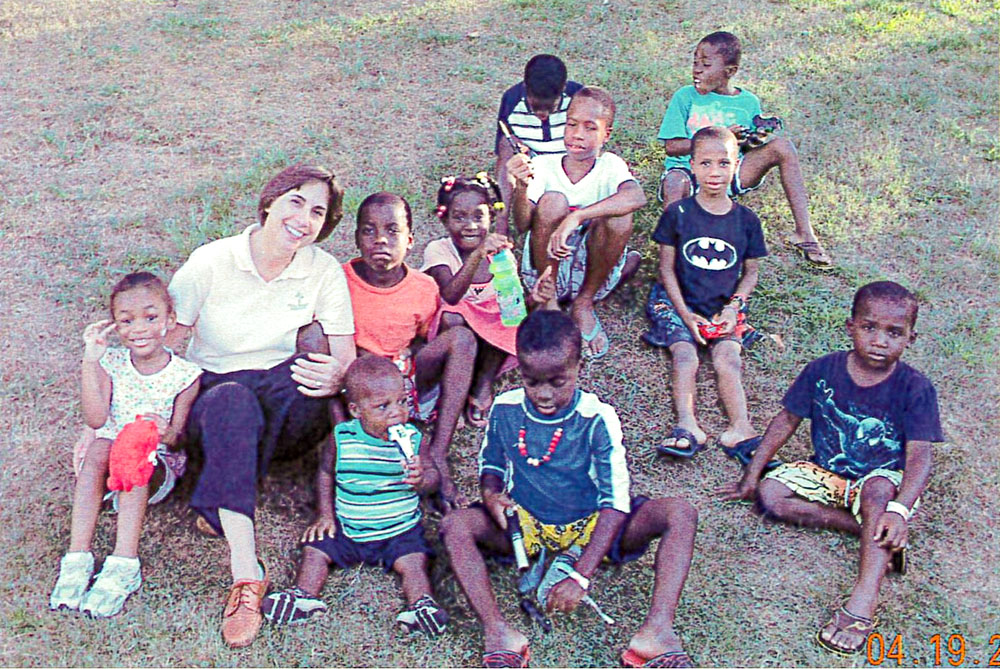
Holy Family of Nazareth Sr. Linda Yankoski is pictured with children from Haiti at the Holy Family Institute in Pittsburgh in 2010. (Courtesy of Holy Family Institute)
What makes you most proud?
That we are known for good work, that we can be trusted. During his first term, when [President Donald] Trump separated children from parents at the border, we had a child named Jorge, and we were finally able to reach his mother on the phone. My staff member told her, "Your son is here at Holy Family Institute with Sister Linda."
When she heard that her child was at Holy Family Institute and there were sisters here, she could immediately relax and work on her asylum situation because her child was safe.
This is the first time that Holy Family Institute will have a layperson as leader. What do you think of this change?
We don't have a sister to take over, but I think it's a good thing. In the church, everyone's decrying the fact that there aren't as many sisters anymore, there aren't as many priests anymore. My thought is, this is everyone's church. It's not just for priests and nuns. It's nice to see laity step up and be involved and have the same opportunities.
It's time for the lay folks to say, "This is our church," and help lead. But I don't think it'll work for a lay leader unless they see it as a vocation, as a calling. I don't think you can lead an organization that's had religious leadership for 125 years without contemplating that and trying to see it from the eyes of faith and mission.
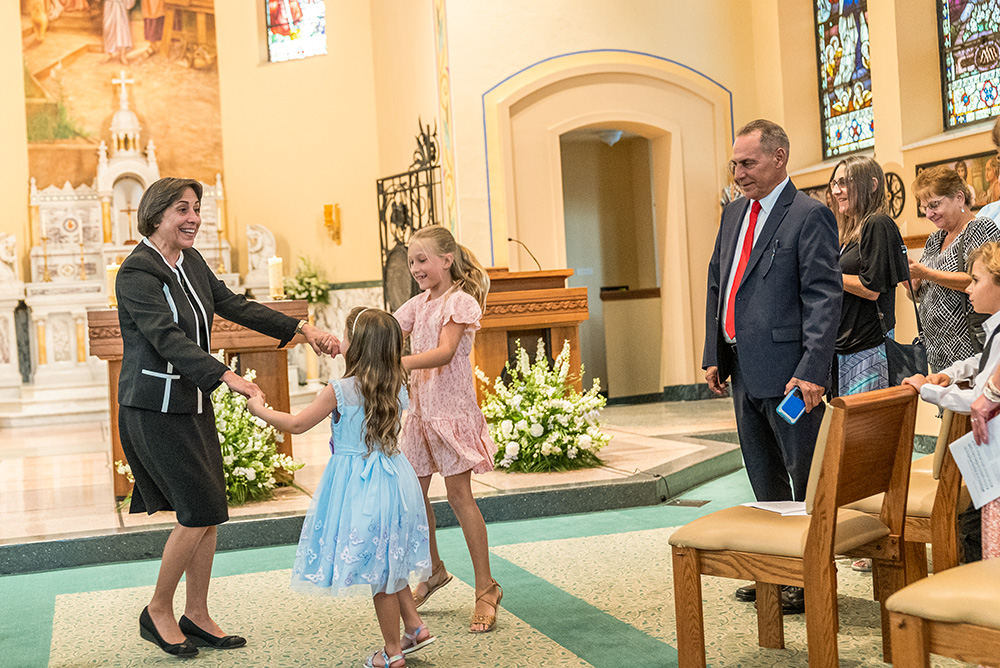
Sr. Linda Yankoski dances with relatives at her 50th jubilee as a Sister of the Holy Family of Nazareth in 2022. (Courtesy of Holy Family Institute)
How will you pass on the charism to a layperson?
We went on a pilgrimage in Chicago to walk in the footsteps of our founders. I will be taking our lay leaders to Poland and Rome. It makes a difference in their work. They're going to see this as a calling not only for themselves but for their families. I think if we can keep that alive, the lay folks are going to be just fine.
One thing the Catholic Church does well is tradition. You can go anywhere in the world and Mass is Mass. If we share it well and we make time for opportunities to pray together to reflect together, we keep the spirit alive. If it's not me, it'll be somebody else. How do I help the next person be the mission integration person? How do we get the next layperson to step up and your job is to do what Sister Linda was doing?
What is the best thing about being a Holy Family Sister?
I think we have a spirit of unity in diversity. We are just so diverse in lots of ways, you know, cultures, nationalities and different spiritualities, and somehow there is still this sense that we can still be together. I feel accepted.
I would do this all over again. I've been blessed. It's been a great life, and now that I even know how it's ending, I would not have changed my choice for anything in the world. For me, this is what I was called to do.
What are you reading?
Eve: How the Female Body Drove 200 Million Years of Human Evolution, by Cat Bohannon. I got a copy for my sister because I thought it would be fun to have somebody to talk it over with. I said, "Sharon, here's what we're going to read next!"
